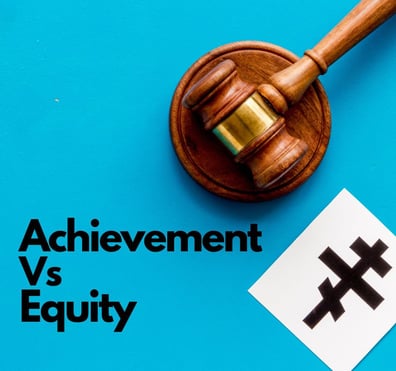A judge ruled recently that schools must prioritize student’s ability to advance over promoting equity. Should we be prioritizing academics over equity? What do you think?

A Firestorm of Debate
A recent ruling by a California judge has ignited a firestorm of debate across the state’s education system. The judged ruled that schools are allowed to prioritize academics over equity.
I don’t normally write about this type of thing but I think is an interesting debate. How do we allocate resources when the needs of our students are at odds?
The case involved the Fremont Unified School District, which had implemented a policy to promote equity by allocating resources and funding based on a school’s demographic makeup.
However, a group of parents sued the district, arguing that the policy violated their children’s right to equal educational opportunities.
Prioritizing Academics over Equality

The judge’s decision was a landmark ruling, declaring that the district must prioritize academic achievement over equity. This ruling has significant implications for the future of education in California and beyond, sparking discussions around how best to balance equity and achievement in education policy and resource allocation.
A Positive Ruling for Some
For many educators and policymakers, the ruling is a welcome change. They believe that academic achievement should be the primary focus of schools and that resources and funding should be allocated based on academic performance.
They argue that students should be rewarded for their hard work and that prioritizing achievement will help to create a level playing field for all students.
Concern for Others

However, others are concerned that the ruling will only exacerbate the achievement gap, which already exists between students from different socio-economic and racial backgrounds.
They argue that the focus on academic achievement will disproportionately benefit students from privileged backgrounds while further marginalizing those who face systemic barriers to academic success.
Statistics
These concerns are not unfounded. According to a report by the National Center for Education Statistics, students from low-income families and students of color are less likely to achieve academic success than their wealthier and white peers.
Inequitable resource allocation and funding have been cited as contributing factors to this achievement gap.
Questions about Educational Equity
The ruling also raises broader questions about the role of equity in education. Equity is the principle of providing each student with the resources and support they need to succeed, regardless of their background.
Equity is not the same as equality, which assumes that everyone has the same needs and abilities.
The Challenge

While many educators and policymakers support equity, the implementation of equitable policies and practices can be challenging.
The Fremont Unified School District’s policy was an attempt to allocate resources and funding based on a school’s demographic makeup, with the goal of promoting equity.
However, the policy was challenged by parents who felt that it unfairly advantaged some students over others.
The challenge for educators and policymakers is to find a balance between equity and achievement. Both are essential for providing students with a high-quality education, but prioritizing one over the other can lead to unintended consequences.
For example, prioritizing achievement over equity may result in fewer resources and funding for students who need them the most, perpetuating the achievement gap.
Finding Solutions
The California ruling highlights the tension between these two priorities and underscores the importance of finding solutions that work for all students.
This ruling has the potential to inspire changes in education policy and resource allocation across the country, making it crucial to consider its potential impact on the education system as a whole.
I think it would be a good idea for more high schools to build relationships with local community colleges. Community colleges have the resources to offer higher level courses, which would solve the problem for higher achieving students.
Conclusion

In conclusion, the California judge’s ruling on equity vs. achievement has sparked a heated debate about the future of education in California and beyond.
As an educator, I often struggle to find a balance between providing my highest achieving students and my lowest achieving students equally challenging assignments, as they are often in the same classes.
As the gap widens, more of these situations are on the horizon. The ruling underscores the importance of finding a balance between equity and achievement, and it’s crucial that educators, policymakers, and the public work together to create policies and practices that support all students.
What do you think? Do you think the ruling was fair?






The Risks Of Bringing Untrained Teachers Into The Classroom - The Weary Educator
[…] There are many issues plaguing parents, educators, and schools. We often seem at odds with each other. However, everyone wants what’s best for the children. […]
6 Reasons You Should Take Community College Courses in High School - The Weary Educator
[…] and reassess their chances of getting into their dream college. Parents and guardians try to ensure they provide everything to succeed. Everyone wants to get a leg up on their student’s college education. Test scores, GPA, and […]
6 Reasons You Should Take Community College Courses in High School - The Weary Educator
[…] costs, and provide students with a taste of college life. It may also alleviate the pressure to balance equity and achievement for […]